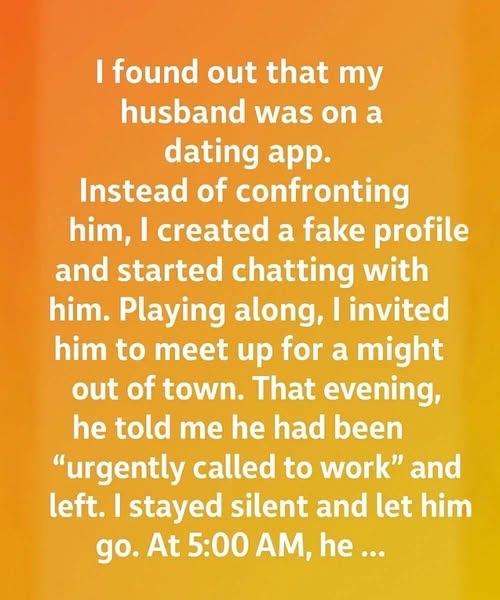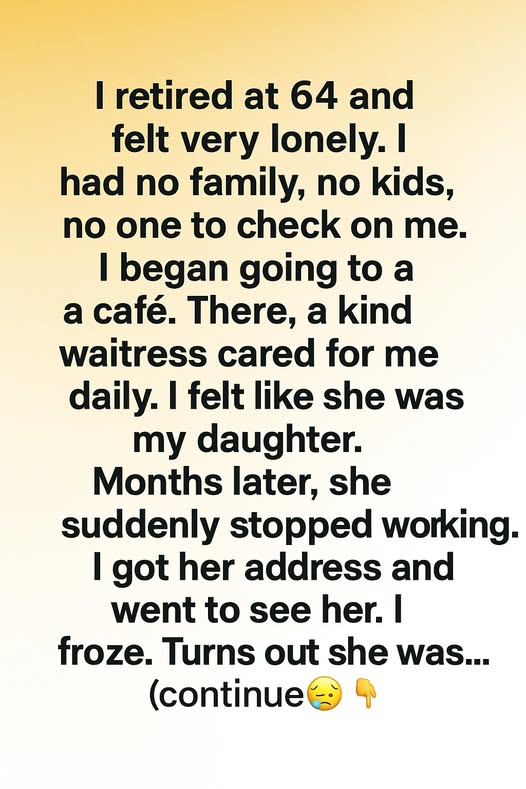I never imagined I would become the kind of person who snoops. Trust had always been the compass in my marriage, the foundation on which I built my life with my husband. For years, I believed that honesty was the bedrock of love, and I never thought I would question that foundation. But the day I discovered that my husband had joined a dating app, my world tilted on its axis.
At first, anger was all I felt. I wanted to storm into the room, confront him, demand an explanation, and unleash the tidal wave of betrayal boiling inside me. But then, a quieter voice in my mind whispered: What if you’re wrong? What if this is a misunderstanding? What if you need proof before you speak? That hesitation changed everything. It led me to a choice I never thought I’d make, a choice that altered my life and my marriage forever.
Building the Profile
Late one evening, after staring at the glow of his phone and fighting back tears, I made my move. With shaky hands, I created a new profile on the very app he had downloaded. I used a convincing photo, built a believable backstory, and crafted it with care. This wasn’t about revenge or manipulation. I reminded myself over and over—it was about clarity.
I told myself I just needed confirmation, that I could handle the truth if it was laid out plainly. What I wasn’t prepared for was how quickly the truth would come. Within hours of setting up the profile, my husband had already “liked” it.
My heart raced. The man who sat across from me at the dinner table, who kissed me goodnight, who had promised fidelity—was now flirting with a stranger who didn’t even exist. Except that “stranger” was me.
I initiated a casual conversation, pretending to be someone else entirely. What unfolded on the screen shattered me. His responses weren’t vague or cautious. They were flirtatious, suggestive, and deeply engaged. It wasn’t idle curiosity; it was a deliberate betrayal. He was pursuing something I thought we had built together. And I only saw it because I had dared to create that secret profile.
The Confrontation
The next morning, clarity settled over me like a storm breaking. I was done with doubt. I confronted him calmly, screenshots in hand. The look on his face will stay with me forever—first shock, then guilt, then resignation. There was no attempt to twist the truth. No arguments, no excuses strong enough to stand against the evidence I laid out.
He confessed. He admitted curiosity had driven him to download the app, that boredom had tempted him to wander, and that his “conversations” were just a lapse in judgment. To him, it wasn’t real—it was just a game, a distraction. To me, it was a wrecking ball that had slammed into the trust I thought was unshakable.
My anger surged like fire, but I refused to lose myself in rage. I realized something powerful in that moment: if I had confronted him too soon, without proof, the fight could have spiraled into denial and gaslighting. I might have questioned myself, doubted my instincts, and walked away even more confused. Instead, I had evidence. I had the truth. And that truth gave me power.
Lessons Learned
Looking back, I see that the secret profile revealed more than just infidelity—it revealed strength within me that I hadn’t known was there. I had taken control of my uncertainty without letting suspicion and paranoia destroy me first. I had prepared myself emotionally to face the reality, no matter how painful.
The fallout was brutal. Our marriage was suddenly a battlefield of difficult conversations, broken trust, and decisions about whether the damage could ever be repaired. But because I had approached the situation with clarity and preparation, I could face those conversations from a place of strength rather than desperation.
I realized something essential: truth, no matter how ugly, is always better than living in doubt. Lies and suspicion rot the soul from the inside out. But the truth, even when it cuts deep, offers a way forward—whether that way is rebuilding, setting boundaries, or walking away.
A New Perspective
I won’t pretend the aftermath was easy. Rebuilding trust, if it’s even possible, is like learning to walk again after breaking both legs—it’s painful, slow, and uncertain. But the experience forced me to redefine what I believed about love and loyalty. I stopped seeing myself as a passive partner waiting for honesty to be handed to me. Instead, I became an active participant in protecting my own emotional well-being.
Today, I no longer see my actions as snooping or deceit. I see them as survival—an act of self-preservation in the face of betrayal. Creating that hidden profile was the moment I chose clarity over blindness, truth over comforting lies.
Whether or not our marriage survives in the long run, I know this much: I am stronger now. I understand the importance of trusting my instincts, gathering proof when necessary, and never letting doubt consume me silently. I also understand that honesty must be mutual, not just expected.
My husband showed me his flaws, but I discovered my resilience. And in the end, that secret profile didn’t just expose him—it revealed me.



